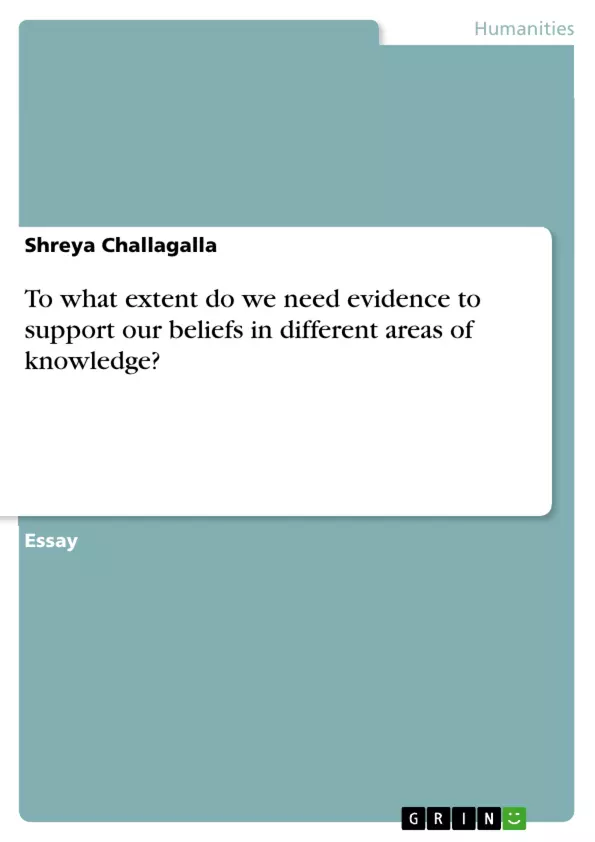Evidence is any piece of “information that supports a conclusion”. Belief on the other hand, is the root cause for our way of thinking, while faith, according to St Paul is, “the conviction of things hoped for and the assurance of things not seen”. These definitions however differ amongst people. This paper explores to what extent we need evidence to support our beliefs in different areas of knowledge. To do so, the paper cites examples from history, the natural sciences and the social sciences.
Inhaltsverzeichnis (Table of Contents)
- Evidence and Belief
- History
- The Dead Sea Scrolls
- The Iron Pillar at the Qutab Minar
- Human Sciences
- The Telangana Issue
- Eyewitness Testimony
- Cognitive Dissonance
Zielsetzung und Themenschwerpunkte (Objectives and Key Themes)
This essay explores the relationship between evidence and belief across various fields of knowledge, including History, Human Sciences, and Natural Sciences. It examines the role of emotions, perceptions, and biases in shaping our beliefs and how evidence can be used to counterbalance them.
- The importance of evidence in different areas of knowledge
- The influence of emotions, perceptions, and biases on belief formation
- The distinction between belief, faith, and evidence
- The role of empirical evidence in Human Sciences
- The challenges of generalizing research findings in Human Sciences
Zusammenfassung der Kapitel (Chapter Summaries)
The essay begins by introducing the concepts of evidence, belief, and faith, highlighting the differing interpretations of these terms. It then delves into the field of History, emphasizing the crucial role of evidence in establishing historical facts and the challenges of sifting through conflicting sources. The author uses the example of the Dead Sea Scrolls to illustrate the need for careful verification and corroboration of historical evidence.
Moving onto the Human Sciences, the essay explores the influence of emotions and biases on beliefs, using the Telangana issue in India as a case study. The author discusses the role of confirmation bias and the importance of separating emotions from objective decision-making. The essay then examines the role of empirical evidence in psychology, using the example of eyewitness testimony research to illustrate the challenges of interpreting and generalizing empirical data.
Finally, the essay delves into the concept of cognitive dissonance, using Festinger's study of a doomsday cult to highlight how people can maintain their beliefs in the face of contradictory evidence. The essay concludes by emphasizing the need for a holistic approach to knowledge claims in the Human Sciences, recognizing the potential for reductionism and determinism.
Schlüsselwörter (Keywords)
This essay explores key concepts such as evidence, belief, faith, history, human sciences, natural sciences, empirical evidence, emotions, perceptions, biases, confirmation bias, cognitive dissonance, eyewitness testimony, and research methodology. It delves into the role of evidence in shaping knowledge claims and the interplay between belief systems and scientific inquiry across various disciplines.
Frequently Asked Questions
How does evidence differ from belief?
Evidence is information that supports a conclusion, while belief is a personal conviction that may or may not be based on objective facts.
What is the role of evidence in History?
In History, evidence like the Dead Sea Scrolls is essential to establish facts and verify past events, counteracting subjective interpretations.
What is cognitive dissonance?
Cognitive dissonance occurs when a person holds contradictory beliefs or faces evidence that contradicts their beliefs, often leading them to rationalize or ignore the new evidence.
Why is eyewitness testimony problematic in human sciences?
Research shows that human perception and memory are fallible and can be influenced by emotions, making eyewitness accounts unreliable without corroborating evidence.
What is confirmation bias?
It is the tendency to search for, interpret, and remember information in a way that confirms one's pre-existing beliefs or hypotheses.
- Quote paper
- Shreya Challagalla (Author), 2011, To what extent do we need evidence to support our beliefs in different areas of knowledge?, Munich, GRIN Verlag, https://www.grin.com/document/292901



